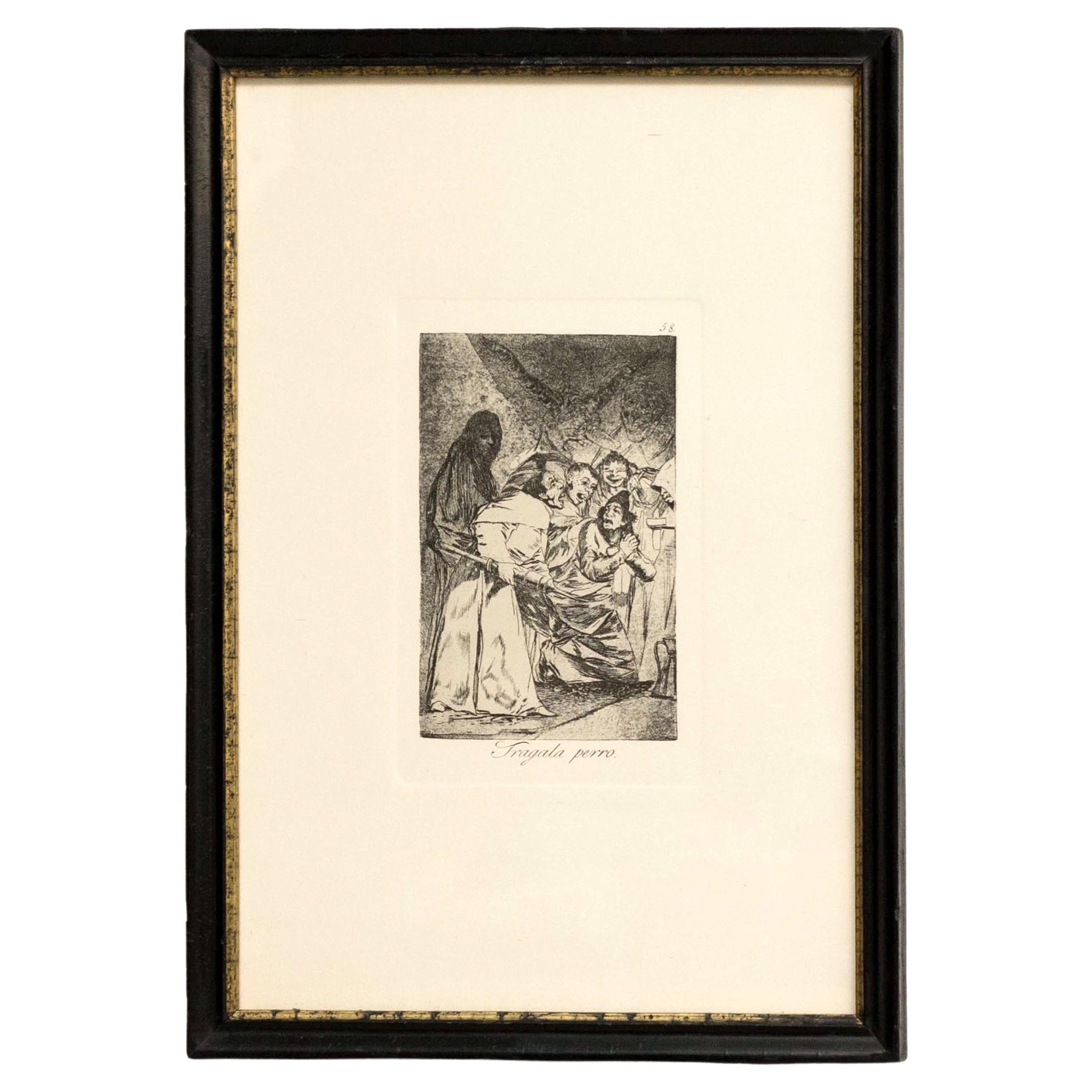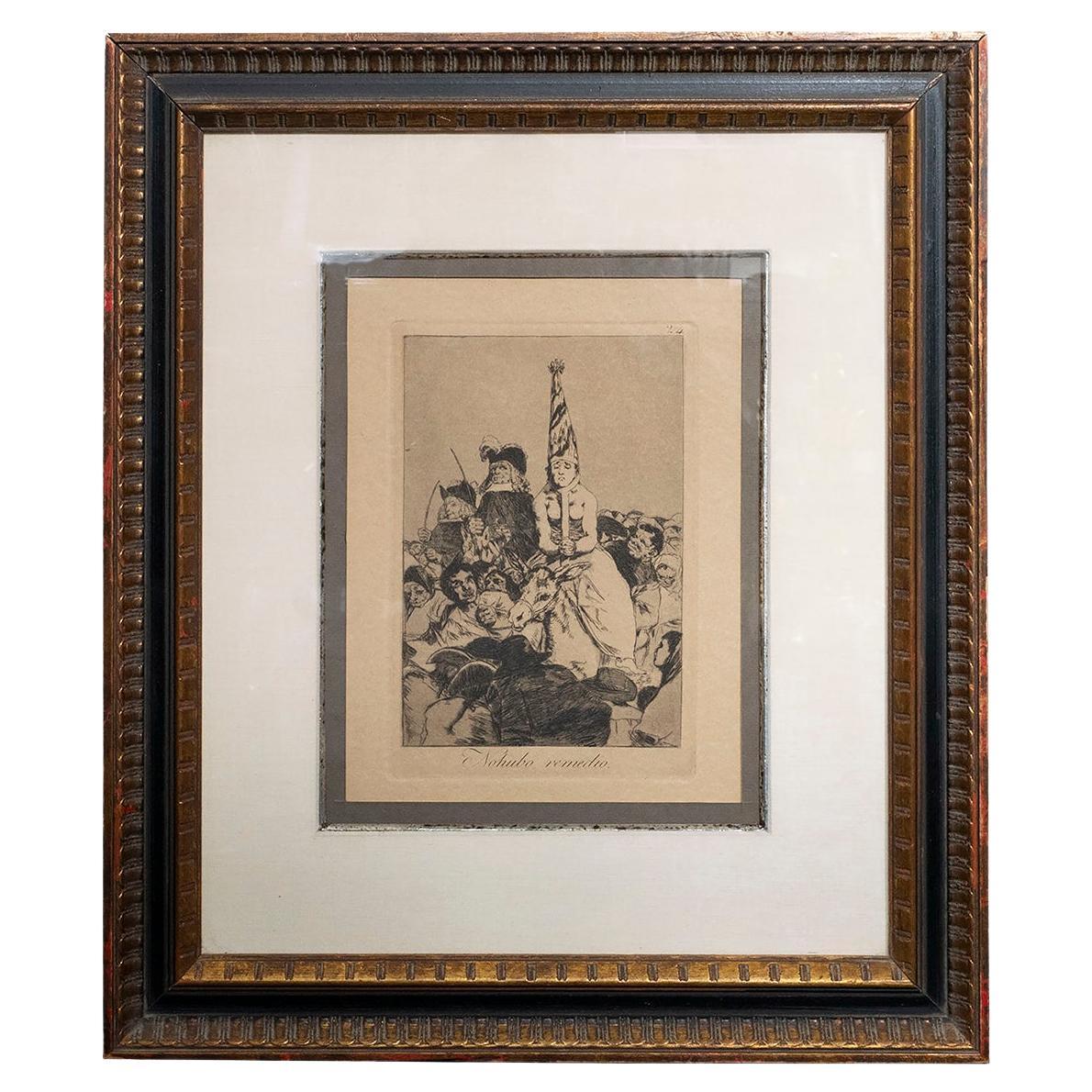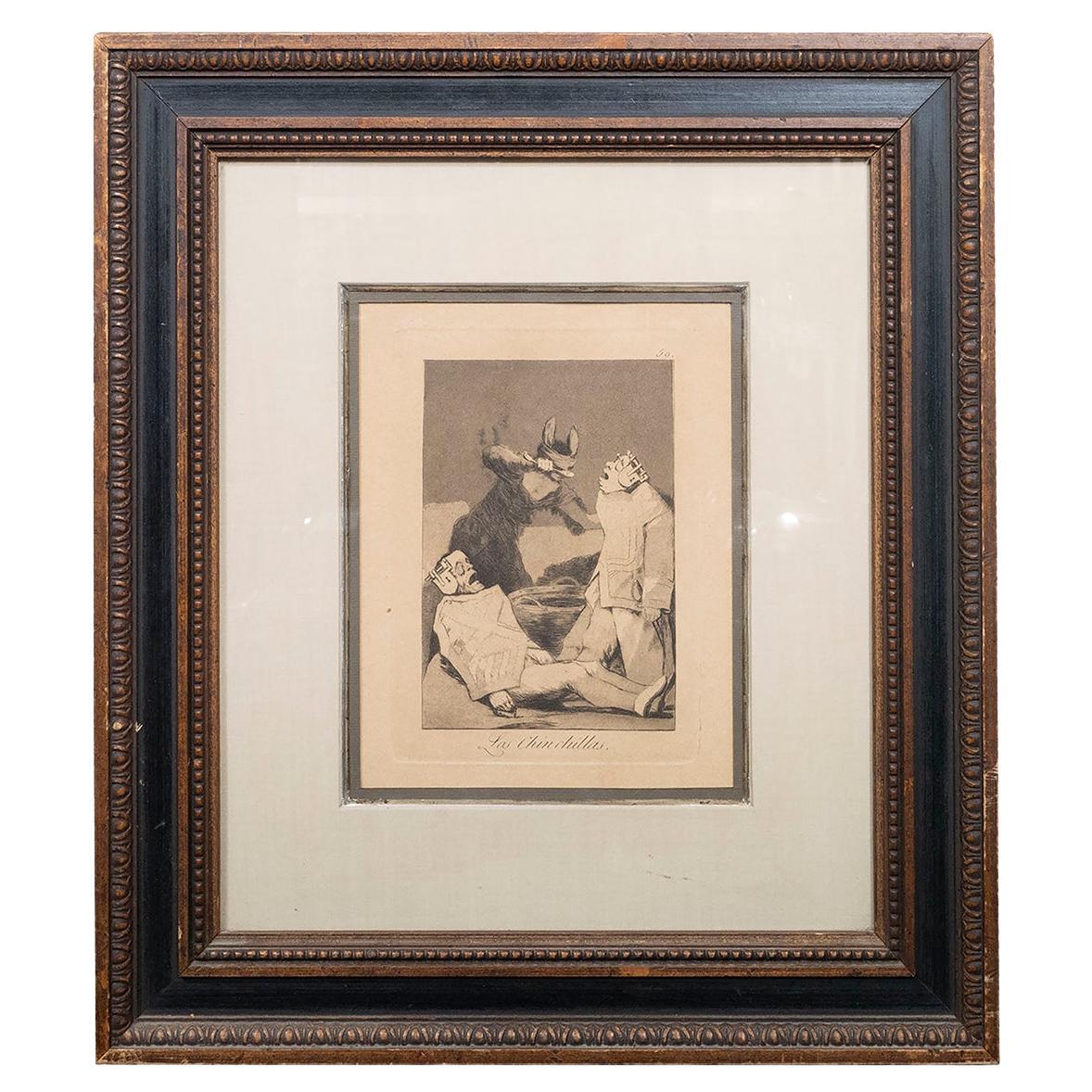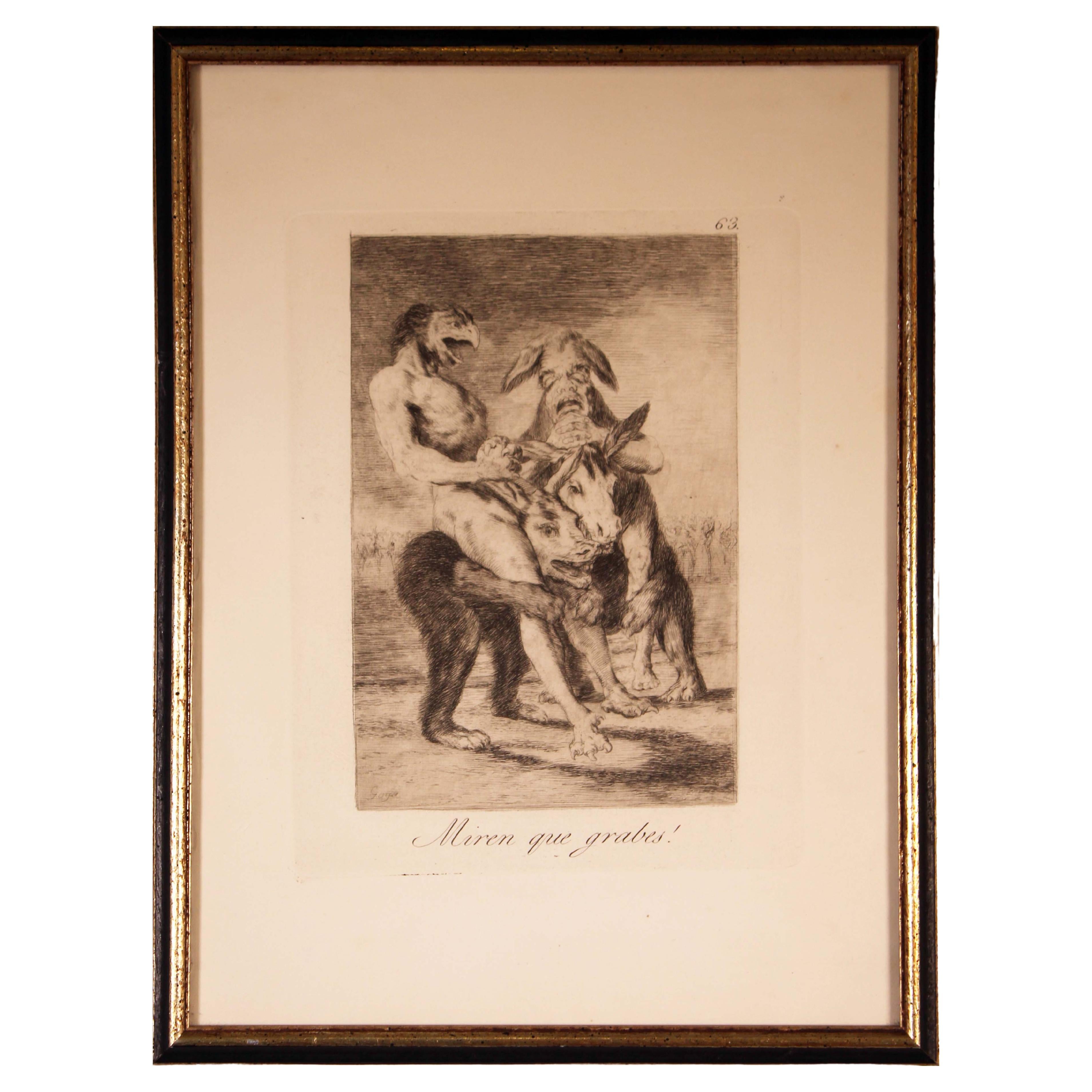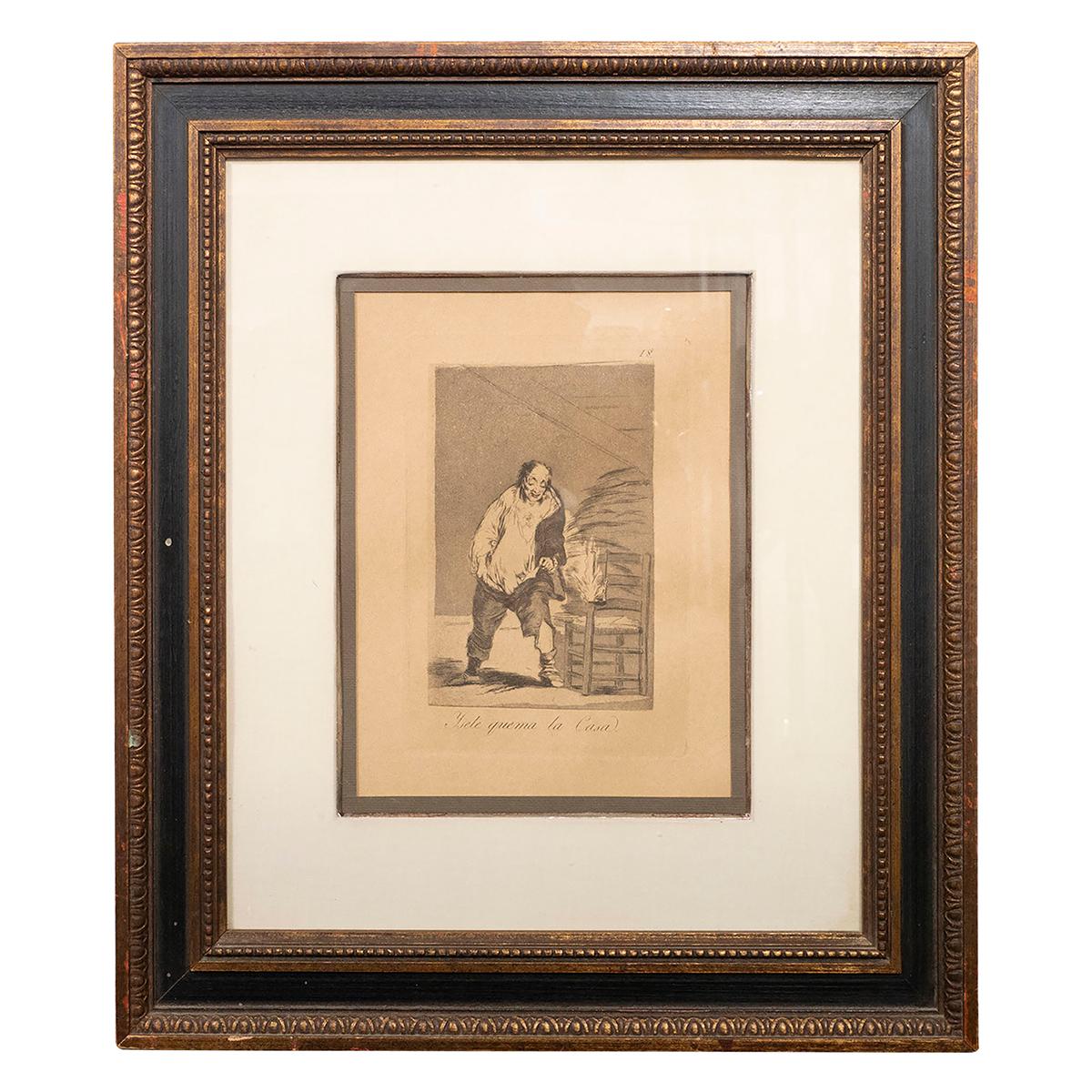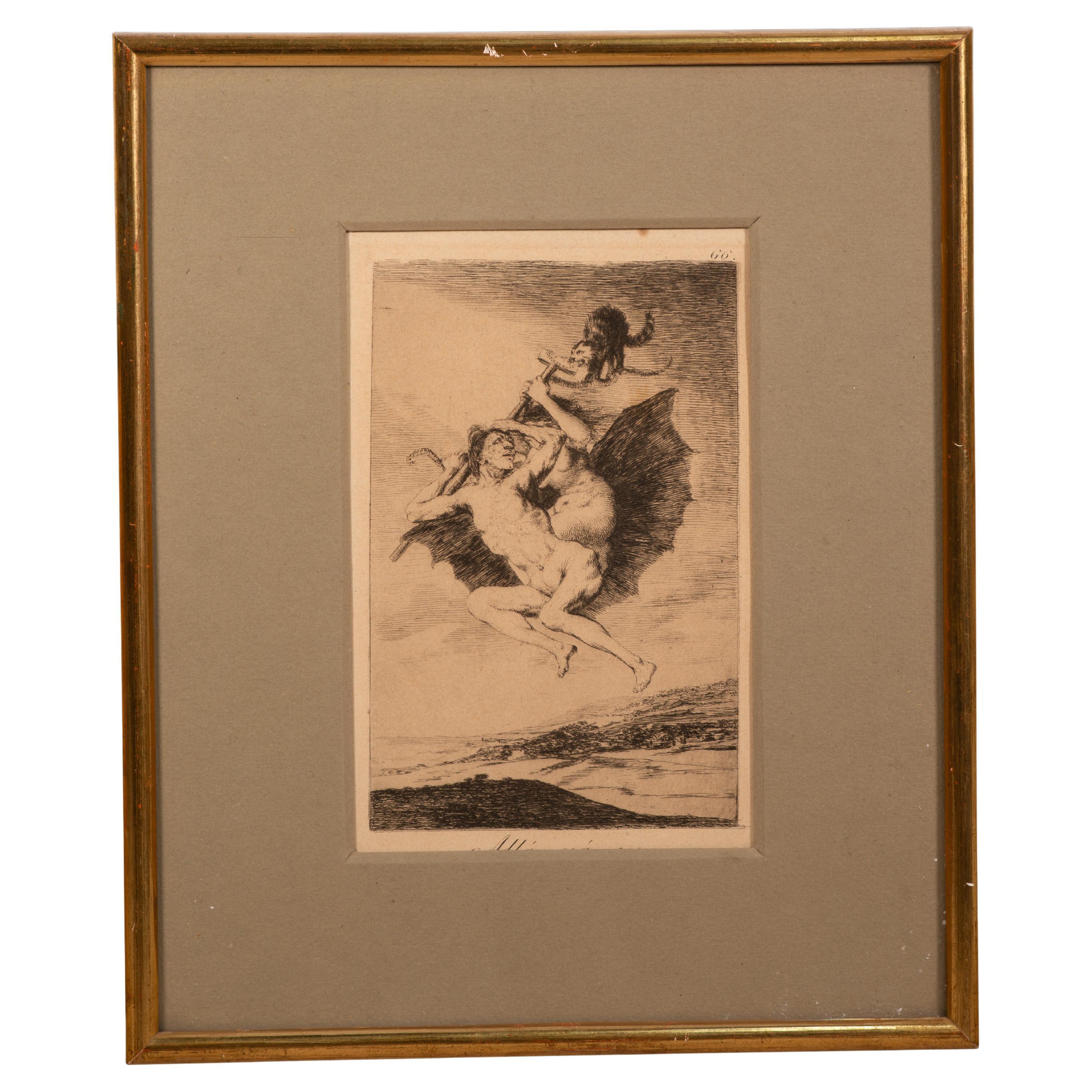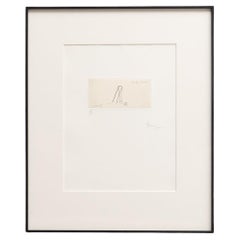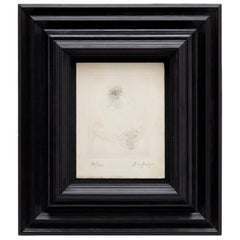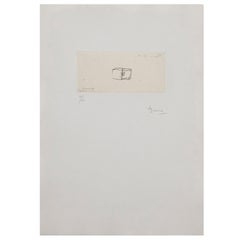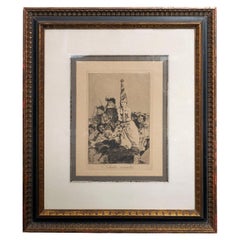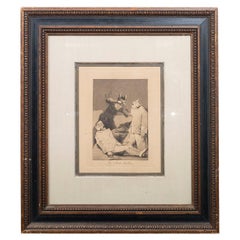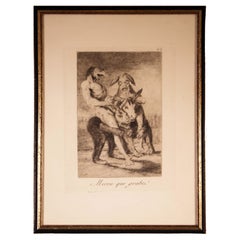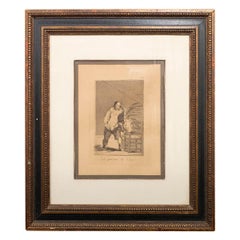Items Similar to Goya's Etching Unos á Otros 1797-1799 for Prado Museum in Madrid
Want more images or videos?
Request additional images or videos from the seller
1 of 11
Goya's Etching Unos á Otros 1797-1799 for Prado Museum in Madrid
$754.76
$3,243.1076% Off
£564.95
£2,427.5476% Off
€640
€2,75076% Off
CA$1,038.76
CA$4,463.4376% Off
A$1,157.81
A$4,974.9576% Off
CHF 607.46
CHF 2,610.1976% Off
MX$14,138.71
MX$60,752.2976% Off
NOK 7,691.79
NOK 33,050.6476% Off
SEK 7,269.91
SEK 31,237.8976% Off
DKK 4,872.13
DKK 20,934.9476% Off
About the Item
Archive Goya's etching "Tragala Perro" for Prado Museum in Madrid.
In 1797-1799.
In original condition, with minor wear consistent with age and use, preserving a beautiful patina.
The etching comes framed.
Later edition from around 1950.
Materials:
Paper
Wood
Glass
Dimensions:
H 48,5 cm
W 35 cm
D 2 cm
Francisco José De Goya y Lucientes was borm to a middle-class family in 1746, in Fuendetodos in Aragon. He was a Spanish romantic painter and printmaker. He is considered the most important Spanish artist of the late 18th and early 19th centuries. His paintings, drawings, and engravings reflected contemporary historical upheavals and influenced important 19th-20th- century painters. Goya is often referred to as the last of the Old Masters and the first oh the moderns.
- Creator:Francisco De Goya (Author)
- Dimensions:Height: 19.3 in (49 cm)Width: 13.78 in (35 cm)Depth: 0.79 in (2 cm)
- Style:Mid-Century Modern (In the Style Of)
- Materials and Techniques:
- Place of Origin:
- Period:
- Date of Manufacture:circa 1950
- Condition:Wear consistent with age and use.
- Seller Location:Barcelona, ES
- Reference Number:Seller: G.ETCHINGGOYA.1A.AR.NL.000931stDibs: LU1427226223342
About the Seller
4.9
Platinum Seller
Premium sellers with a 4.7+ rating and 24-hour response times
Established in 2015
1stDibs seller since 2015
1,864 sales on 1stDibs
Typical response time: 11 hours
- ShippingRetrieving quote...Shipping from: Barcelona, Spain
- Return Policy
Authenticity Guarantee
In the unlikely event there’s an issue with an item’s authenticity, contact us within 1 year for a full refund. DetailsMoney-Back Guarantee
If your item is not as described, is damaged in transit, or does not arrive, contact us within 7 days for a full refund. Details24-Hour Cancellation
You have a 24-hour grace period in which to reconsider your purchase, with no questions asked.Vetted Professional Sellers
Our world-class sellers must adhere to strict standards for service and quality, maintaining the integrity of our listings.Price-Match Guarantee
If you find that a seller listed the same item for a lower price elsewhere, we’ll match it.Trusted Global Delivery
Our best-in-class carrier network provides specialized shipping options worldwide, including custom delivery.More From This Seller
View AllGoya's Etching Tragala Perro 1797-1799 for Prado Museum in Madrid
By Francisco De Goya
Located in Barcelona, Barcelona
Goya's etching "Tragala Perro" for Prado Museum in Madrid.
In 1797-1799.
In original condition, with minor wear consistent with age and use, preserving a...
Category
Vintage 1950s Spanish Mid-Century Modern Contemporary Art
Materials
Glass, Wood, Paper
$754 Sale Price
76% Off
Joan Brossa Framed Etching
By Joan Brossa
Located in Barcelona, Barcelona
Framed Lithography made by Joan Brossa, circa 1970.
Limited edition of 50 copies. Numbered (36/50) and hand-signed.
In original good condition.
Joan Brossa (1919-1998) was a Catal...
Category
Vintage 1970s Spanish Modern Prints
Materials
Paper
$849 Sale Price
63% Off
Brassaï Lithography Hand Signed
By Brassaï
Located in Barcelona, Barcelona
Lithography hand signed by Brassaï from the book "Historie de Marie"
Limited edition of 12/ 126
With some moisture spots
Framed on a 20th century ...
Category
Vintage 1940s French Mid-Century Modern Drawings
Materials
Paper
$2,934 Sale Price
50% Off
Joan Brossa Etching
By Joan Brossa
Located in Barcelona, Barcelona
Etching made by Joan Brossa, circa 1970.
Limited edition of 50 copies. Numbered (36/50) and hand-signed.
In original good condition.
Joan Brossa (1919-1998) was a Catalan po...
Category
Vintage 1970s Spanish Modern Prints
Materials
Paper
$477 Sale Price
77% Off
Picasso’s "Toros y Toreros" Framed Print – 1961 First Edition
By Pablo Picasso
Located in Barcelona, Barcelona
This striking black and white print by Pablo Picasso comes from the first edition of Toros y Toreros (1961), capturing the artist's dynamic abstraction of a bullfighting scene. Frame...
Category
Vintage 1960s Spanish Mid-Century Modern Prints
Materials
Paper
$531 Sale Price
50% Off
Charles Dufresne Framed 'Descente de Croix' Lithography, circa 1971
Located in Barcelona, Barcelona
Original 'Descente de croix' color lithograph by Charles Dufresne.
Lithograph printed from an original painting made by the author in France, circa 1932.
Published by Mourlot i...
Category
Vintage 1970s French Modern Paintings
Materials
Paper
$972 Sale Price
76% Off
You May Also Like
Old Master Etching and Aquatint
By Francisco De Goya
Located in Tarrytown, NY
Plate #24 from Francisco de Goya's "Los Caprichos" series titled "Nohubo Remedio." Printed on wove paper. Double matted and contained under glass in an ebonized and parcel gilt wood ...
Category
Antique 19th Century Spanish Romantic Prints
Materials
Giltwood, Paper
Old Master Etching and Aquatint
By Francisco De Goya
Located in Tarrytown, NY
Plate #50 from Francisco de Goya's "Los Caprichos" series titled "Los Chinchillas." Printed on wove paper. Double matted and contained under glass in an ebonized and parcel gilt wood...
Category
Antique 19th Century Spanish Romantic Prints
Materials
Giltwood, Paper
Francisco Goya Miren Que Grabes from Los Caprichos 1868 Etching Framed
By Francisco Goya
Located in Keego Harbor, MI
A macabre etching and aquatint on paper titled “Miren que grabes!” from Los Caprichos by Spanish artist Francisco Goya. Signed in the plate. Numbered 63 ...
Category
Antique 1860s Prints
Materials
Paper
Old Master Etching and Aquatint
By Francisco De Goya
Located in Tarrytown, NY
Plate #18 from Francisco de Goya's "Los Caprichos" series titled "Ysele Quema La Casa." Printed on wove paper. Double matted and contained under glass in an ebonized and parcel gilt ...
Category
Antique 19th Century Spanish Romantic Prints
Materials
Giltwood, Paper
“Allá va eso”, Los Caprichos. Framed engraving. Original by GOYA Y LUCIENTES
By Francisco De Goya
Located in Madrid, ES
“There goes that”, Los Caprichos. Framed engraving. Original by GOYA Y LUCIENTES, Francisco.
It has damage.
The original was an etching belonging to the series Los Caprichos by Fran...
Category
Antique 19th Century Spanish Other Prints
Materials
Other
Tan Barbara la Seguridad Como el Delito - Etching by Francisco Goya - 1867
By Francisco Goya
Located in Roma, IT
The custody is as barbarous as the crime (Tan barbara la seguridad como el delito) is an artwork realied by Francisco Goya y Lucientes, 1867.
Paris: Delâtre, 1867.
Etching and burin.
cm. 10.5x8.4.Sheet 21x16.2.
Excellent proof of III state and first edition after the appearance of the letter and the bevel of the plate, published in the Gazette des Beau-Arts, vol. XXII, p. 196.
Ref. Harris 26
Intact sheet with wide margins. Slight exposure yellowing around image.
Francisco José de Goya y Lucientes (Fuendetodos, March 30, 1746 - Bordeaux, April 16, 1828) was a Spanish painter and engraver. Considered the pioneer of modern art, he was one of the greatest Spanish painters who lived between the late eighteenth and early nineteenth centuries. His paintings, drawings and etchings of him reflected the ongoing historical upheavals and influenced the most important contemporary and following century painters. Goya is often referred to as the last of the old masters and the first of the moderns. Born into a middle-class family in 1746 in Aragon, he was a pupil of painting from the age of 14 to José Luzán y Martínez, later moving to Madrid to study with Anton Raphael Mengs. In 1786 he became court painter to the Spanish crown and this first part of his career was characterized by numerous portraits of members of the Spanish aristocracy and royal family, as well as by the production of rococo tapestries for the royal palace.
In 1793 he suffered from an undiagnosed serious illness which left him deaf, after which his work became progressively darker and more pessimistic. His subsequent paintings seem to reflect a bleak vision of existence, which contrasts with his resounding social ascent: in 1799, in fact, he became Primer Pintor de Cámara (First Court Painter), the highest rank for a Spanish court painter . In late 1799, commissioned by Godoy, he completed his Maja desnuda, a remarkably bold nude for the time and clearly inspired by the style of Diego Velázquez. In the early 19th century he painted The Family of Charles IV, again influenced by Velázquez. In 1807, Napoleon led the Grand Army in the Peninsular War against Spain. During the conflict Goya remained in Madrid and, although he never expressed his thoughts in public, it seems that these facts affected him deeply, as can be seen from some of his works such as The Disasters of War, The 2nd of May 1808, The 3rd May 1808. Other works of his maturity include a wide variety of paintings concerning madness, asylums, witches, fantastic creatures, and religious and political corruption, which suggest that he feared for his mental and physical health. His later period culminates with the Black Paintings of 1819-1823, made in the Quinta del Sordo, his home on the outskirts of Madrid where he lived, disillusioned by political and social developments in Spain, in a situation of almost isolation. Finally, in 1824, Goya decided to abandon Spain to retire to the French city of Bordeaux...
Category
1860s Modern Figurative Prints
Materials
Etching
